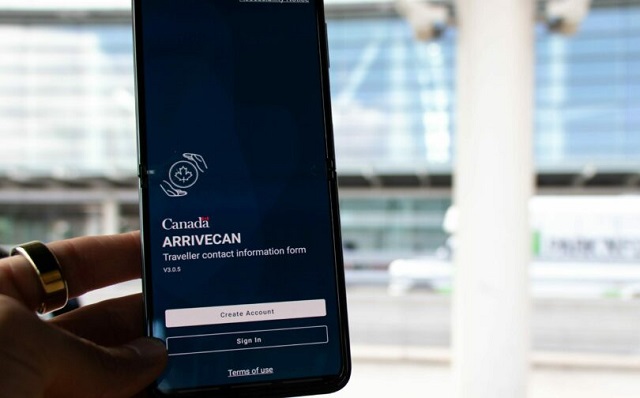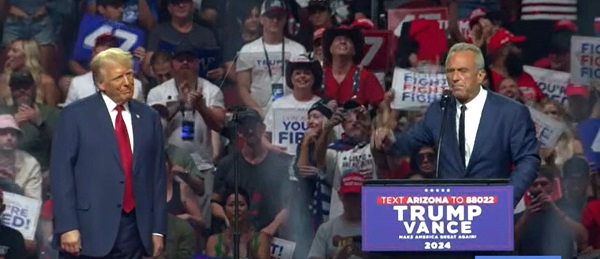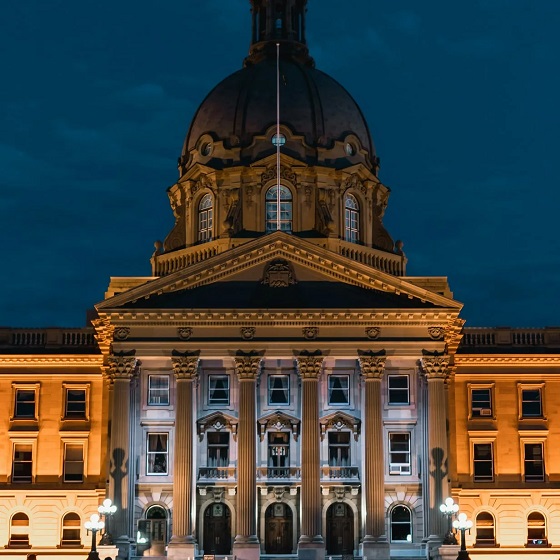National
‘Insider’ connected to ArriveCAN app to testify before House of Commons committee

From LifeSiteNews
The once-mandatory ArriveCAN app cost taxpayers over $50 million, $8.9 million of which was given to an obscure company called GC Strategies which was operated by a two-man team out of an Ontario home.
Canadian MPs investigating the federal government’s $54 million controversial COVID-era ArriveCAN travel app are today questioning an “insider” connected to the app who was claimed to have boasted he “rubbed shoulders” with every assistant “deputy minister in town.”
According to Blacklock’s Reporter, the “insider” to testify before the House of Commons Standing Committee on Government Operations and Estimates (OGGO) as to his involvement with the travel app is consultant Vaughn Brennan, who was reluctantly named as a witness.
According to subcontractors involved in the ArriveCAN app, Brennan had been named as a “self-styled political insider.”
According to witnesses, Brennan said he had “rubbed shoulders with every assistant deputy minister in town” and thought that the $23 million being spent on a sole-sourced contract was “a drop in the bucket.”
To date, Brennan has never spoken publicly about his involvement with the ArriveCAN app, however, it has been confirmed he did work with ArriveCAN consultant GC Strategies Incorporated.
The once-mandatory ArriveCAN app cost taxpayers over $50 million, $8.9 million of which was given to an obscure company called GC Strategies which was operated by a two-man team out of an Ontario home.
The OGGO is investigating how various companies such as Dalian, Coaradix, and GC Strategies received millions in taxpayer dollars to develop the contentious quarantine-tracking ArriveCAN app.
LifeSiteNews last year reported how two tech entrepreneurs testified before the committee that during the development of the ArriveCAN travel app they saw firsthand how federal managers engaged in “extortion,” “corruption,” and “ghost contracting,” all at the expense of taxpayers.
Canada’s Auditor General Karen Hogan announced an investigation of the ArriveCAN app in November of 2022, after the House of Commons voted 173-149 for a full audit of the controversial app.
The OGGO has not yet determined who gave the final approval over the ArriveCAN travel app’s contracts, which paid out millions to consultants.
‘Systemic corruption’ within Trudeau federal government ‘evident to everyone,’ says Conservative MP
Conservative Party of Canada (CPC) MP Stephanie Kusie noted to the committee on October 26, 2023, that it should be “evident to everyone in this room as well as Canadians,” that there is “systemic corruption within this government,” when speaking about ArriveCAN. She added that government corruption “should be absolutely evident.”
According to CPC MP Kelly McCauley, who is chair of the committee, Brennan had declined to testify before it, adding that “GC Strategies is playing hard to get.”
“That would be a polite way of saying it,” said McCauley.
“We have not been able to get a commitment from them despite our clerk going above and beyond in trying to accommodate them. We’re having difficulties with them.”
MPs on the OGGO, without any explanation, were told that a GC Strategies executive “routinely boasted he and his friends, senior government officials with contracting authority, have ‘dirt on each other.’”
Since 2022, GC Strategies has received some $44 million in federal contracts.
Last year LifeSiteNews reported on how during a parliamentary investigation into the misuse of funds used to create the ArriveCAN travel app, Canada’s chief federal technology officer was threatened with contempt of Parliament charges for refusing to give clear answers to questions from MPs regarding his involvement with the much-maligned app.
ArriveCAN was introduced in April 2020 by the Liberal government of Prime Minister Justin Trudeau and made mandatory in November 2020. The app was used by the federal government to track the COVID jab status of those entering the country and enforce quarantines when deemed necessary.
When the app was mandated, all travelers entering Canada had to use it to submit their travel and contact information as well as any COVID vaccination details before crossing the border or boarding a flight.
In October 2021, Trudeau announced unprecedented COVID-19 jab mandates for all federal workers and those in the transportation sector and said the unjabbed will no longer be able to travel by air, boat, or train, both domestically and internationally.
This policy resulted in thousands losing their jobs or being placed on leave for non-compliance.
Trudeau “suspended” the COVID travel vaccine mandates on June 20, 2022. Last October, the Canadian federal government ended all remaining COVID mandates in Canada regarding travel, including masking on planes and trains, COVID testing, and allowing vaccine-free Canadians to no longer be subject to mandatory quarantine.
Over 700 vaccine-free Canadians negatively affected by federal COVID jab dictates have banded together to file a multimillion-dollar class-action lawsuit against the federal government of Prime Minister Justin Trudeau.
Business
Loblaws Owes Canadians Up to $500 Million in “Secret” Bread Cash

Yakk Stack
(Only 5 Days Left!) Claim Yours Before It’s GONE FOREVER
Hey, all.
Imagine this…you’re slicing into that fresh loaf from Loblaws or just making a Wonder-ful sammich, the one you’ve bought hundreds of times over the years, and suddenly… ka-ching!
A fat check lands in your mailbox.
Not from a lottery ticket, not from a side hustle – from the very store that’s been quietly owing you money for two decades of illegal price fixing.
Sound too good to be true?
It’s real.
It’s court-approved.
And right now, on December 7, 2025, you’ve got exactly 5 days to grab your share before the door slams shut. Don’t let this slip away – keep reading, feel that spark of possibility ignite, and let’s get you paid.
Back in 2001, you were probably juggling work, kids, or just surviving on that weekly grocery run. Little did you know, while you were reaching for the President’s Choice white bread or those golden rolls, Loblaws and their cronies were playing a sneaky game of price-fixing. They jacked up the cost of packaged bread across Canada – every loaf, every bun, every sneaky sandwich slice. For 20 years. From coast to coast to coast.
And now…the courts have spoken. $500 million in settlements to make it right. That’s not pocket change – that’s your money, recycled back into your life.
Given the number of people who will be throwing in a claim…this ain’t gunna be life-changing cash…but also, given the cost of food in Canada, it’s better than sweet fuck all, which you will receive by NOT doing this.
If you’re a Canadian resident (yep, that’s you, unless you’re in Quebec with your own sweet deal), and you’ve ever bought bread for your family – not for resale, just real life – between January 1, 2001, and December 31, 2021… you’re in.
No receipts needed.
No fancy proofs.
Just you, confirming your story, and boom – eligible.
Quick check: Were you under 18 back then?
Or an exec at Loblaw?
Nah, skip it.
But for the rest of us everyday schleps…Jackpot.
Again…the clock’s ticking on this.
Claims opened on September 11, 2025, and slam shut on December 12, 2025.
That’s this Friday.
Payments roll out in 2026, 6-12 months later, straight to your bank or mailbox.
Here’s what you need to do…
- Breathe deep, click → HEREQuebec frens →HERE
- 10 second form that’s completed by your autofill…30 seconds off of a mobile device.
- Hit submit and wait for that sweet cash to hit your account.
Again…this won’t be life saving money and most certainly ain’t gunna hit your account before Christmas.
And before you go out an Griswald yourself into a depost on pool in the backyard…you may only end up with enough cash for the Jam-of-the-Month…the gift that truly does give, all year round…just be a little patient.
If you end up with a couple of backyard steaks in time for summer…
Some treats for the children or grandchildren…
Maybe just a donation to the foodbank…
This is what’s owed to you. Your neighbors. Friends. Family.
Take advantage!
Banks
To increase competition in Canadian banking, mandate and mindset of bank regulators must change

From the Fraser Institute
By Lawrence L. Schembri and Andrew Spence
Canada’s weak productivity performance is directly related to the lack of competition across many concentrated industries. The high cost of financial services is a key contributor to our lagging living standards because services, such as payments, are essential input to the rest of our economy.
It’s well known that Canada’s banks are expensive and the services that they provide are outdated, especially compared to the banking systems of the United Kingdom and Australia that have better balanced the objectives of stability, competition and efficiency.
Canada’s banks are increasingly being called out by senior federal officials for not embracing new technology that would lower costs and improve productivity and living standards. Peter Rutledge, the Superintendent of Financial Institutions and senior officials at the Bank of Canada, notably Senior Deputy Governor Carolyn Rogers and Deputy Governor Nicolas Vincent, have called for measures to increase competition in the banking system to promote innovation, efficiency and lower prices for financial services.
The recent federal budget proposed several new measures to increase competition in the Canadian banking sector, which are long overdue. As a marker of how uncompetitive the market for financial services has become, the budget proposed direct interventions to reduce and even eliminate some bank service fees. In addition, the budget outlined a requirement to improve price and fee transparency for many transactions so consumers can make informed choices.
In an effort to reduce barriers to new entrants and to growth by smaller banks, the budget also proposed to ease the requirement that small banks include more public ownership in their capital structure.
At long last, the federal government signalled a commitment to (finally) introduce open banking by enacting the long-delayed Consumer Driven Banking Act. Open banking gives consumers full control over who they want to provide them with their financial services needs efficiently and safely. Consumers can then move beyond banks, utilizing technology to access cheaper and more efficient alternative financial service providers.
Open banking has been up and running in many countries around the world to great success. Canada lags far behind the U.K., Australia and Brazil where the presence of open banking has introduced lower prices, better service quality and faster transactions. It has also brought financing to small and medium-sized business who are often shut out of bank lending.
Realizing open banking and its gains requires a new payment mechanism called real time rail. This payment system delivers low-cost and immediate access to nonbank as well as bank financial service providers. Real time rail has been in the works in Canada for over a decade, but progress has been glacial and lags far behind the world’s leaders.
Despite the budget’s welcome backing for open banking, Canada should address the legislative mandates of its most important regulators, requiring them to weigh equally the twin objectives of financial system stability as well as competition and efficiency.
To better balance these objectives, Canada needs to reform its institutional framework to enhance the resilience of the overall banking system so it can absorb an individual bank failure at acceptable cost. This would encourage bank regulators to move away from a rigid “fear of failure” cultural mindset that suppresses competition and efficiency and has held back innovation and progress.
Canada should also reduce the compliance burden imposed on banks by the many and varied regulators to reduce barriers to entry and expansion by domestic and foreign banks. These agencies, including the Office of the Superintendent of Financial Institutions, Financial Consumer Agency of Canada, Financial Transactions and Reports Analysis Centre of Canada, the Canada Deposit Insurance Corporation plus several others, act in largely uncoordinated manner and their duplicative effort greatly increases compliance and reporting costs. While Canada’s large banks are able, because of their market power, to pass those costs through to their customers via higher prices and fees, they also benefit because the heavy compliance burden represents a significant barrier to entry that shelters them from competition.
More fundamental reforms are needed, beyond the measures included in the federal budget, to strengthen the institutional framework and change the regulatory mindset. Such reforms would meaningfully increase competition, efficiency and innovation in the Canadian banking system, simultaneously improving the quality and lowering the cost of financial services, and thus raising productivity and the living standards of Canadians.
-

 Focal Points1 day ago
Focal Points1 day agoPharma Bombshell: President Trump Orders Complete Childhood Vaccine Schedule Review
-

 Automotive19 hours ago
Automotive19 hours agoTrump Deals Biden’s EV Dreams A Death Blow
-

 Automotive18 hours ago
Automotive18 hours agoCanada’s EV Mandate Is Running On Empty
-

 Business8 hours ago
Business8 hours agoWhy Does Canada “Lead” the World in Funding Racist Indoctrination?
-

 Media8 hours ago
Media8 hours agoThey know they are lying, we know they are lying and they know we know but the lies continue
-

 Daily Caller2 days ago
Daily Caller2 days agoTrump Orders Review Of Why U.S. Childhood Vaccination Schedule Has More Shots Than Peer Countries
-

 Censorship Industrial Complex1 day ago
Censorship Industrial Complex1 day agoFrances Widdowson’s Arrest Should Alarm Every Canadian
-

 Alberta1 day ago
Alberta1 day agoPremier Smith: Canadians support agreement between Alberta and Ottawa and the major economic opportunities it could unlock for the benefit of all












